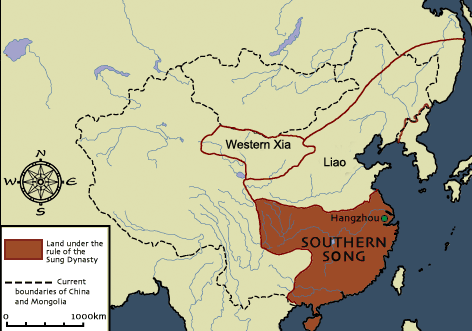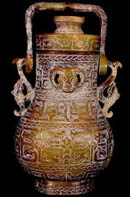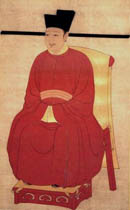Chinese Culture >> Chinese Dynasty >> Song Dynasty
Song Dynasty Background (Year: 960 - 1279)
 The
Song Dynasty (pronounced Soong) ranks up there with the
Tang Dynasty and the
Han Dynasty as one of the great dynasties. Fifty years after the official
end of the Tang Dynasty, an imperial army
re-unified China and established the Song dynasty. The Song dynasty was formed
from one of the five dynasties after the Tang Dynasty. A time of remarkable
advances in technology, culture, and economics, the Song dynasty, despite its
political failures, basically set the stage for the rest of the imperial era.
The most important development during the Song dynasty was that agricultural
technology, aided by the importation of a fast-growing Vietnamese strain of rice
and the invention of the printing press, developed to the point where the
food-supply system was so efficient that, for the most part, there was no need
to develop it further. There was enough food for everyone, more or less, the
system worked, and it became self-sustaining. Because it worked, there was no
incentive to improve it; the system thus remained basically unchanged from the
Song dynasty up until the twentieth century. In fact, many rice farmers in the
Chinese interior and in less-developed regions of south-east Asia are, for the
most part, still using Song-era farming techniques.
The
Song Dynasty (pronounced Soong) ranks up there with the
Tang Dynasty and the
Han Dynasty as one of the great dynasties. Fifty years after the official
end of the Tang Dynasty, an imperial army
re-unified China and established the Song dynasty. The Song dynasty was formed
from one of the five dynasties after the Tang Dynasty. A time of remarkable
advances in technology, culture, and economics, the Song dynasty, despite its
political failures, basically set the stage for the rest of the imperial era.
The most important development during the Song dynasty was that agricultural
technology, aided by the importation of a fast-growing Vietnamese strain of rice
and the invention of the printing press, developed to the point where the
food-supply system was so efficient that, for the most part, there was no need
to develop it further. There was enough food for everyone, more or less, the
system worked, and it became self-sustaining. Because it worked, there was no
incentive to improve it; the system thus remained basically unchanged from the
Song dynasty up until the twentieth century. In fact, many rice farmers in the
Chinese interior and in less-developed regions of south-east Asia are, for the
most part, still using Song-era farming techniques.

The efficiency of the system not only made it economically self-sustaining, but also re-enforced the existing social structure. There were many reforms in the Song dynasty to make the population content. The towns were very important. Socials institutions like hospitals and homes for the aged were formed. Consequently, society and economics were largely static from the Song dynasty until the collapse of the dynastic system in the twentieth century.
This is important because one of the factors behind the Industrial Revolution in Europe was that they didn't have enough people to work the fields. There was an incentive to create better technology in Europe; there was no need in China. China actually had a surplus of human labor. The surplus of human labor led to one of the most important inventions, the gun-powder, because it was the base for the first colts and so it was also important for Europe. The Chinese used the gun-powder to shoot with arrows. Another weapon invented was the throwing machine. Because of the trade the Chinese population became more mobile. In the Song dynasty China was the biggest naval power of the world and the Chinese ships were better developed than the European.
While the Song dynasty was a time of great advances, politically and militarily, the Song dynasty was a failure. The northern half of China was conquered by barbarians, forcing the dynasty to abandon a northern capital in the early 1100's. Then a hundred and fifty years later, the Mongols, fresh from conquering everything between Manchuria and Austria, invaded and occupied China.
Click on pictures below to enlarge.
Chinese Dynasty Quick Links
Tang Dynasty Xia DynastyWestern Zhou Dynasty Eastern Zhou Dynasty Shang Dynasty Qin Dynasty Han Dynasty Three Kingdom Dynasty Sui Dynasty Song Dynasty Yuan Dynasty Ming Dynasty Qing Dynasty Early 20th Century China


